Ana Montes: Closer To A Whistleblower Than A Dangerous Spy

This article was funded by paid subscribers of The Dissenter Newsletter. Become a monthly paid subscriber to help us continue our independent journalism.
“Ana Montes is probably the most dangerous spy that most folks have never heard of,” journalist Jim Popkin declared during an interview for “Washington Post Live” on January 3.
In 2013, Popkin wrote a lengthy feature about Montes for Washington Post Magazine titled, “The Queen of Cuba.” He developed that feature into a book, Code Name Blue Wren: The True Story of America’s Most Dangerous Female Spy—and the Sister She Betrayed, that was published as Montes was released after spending over 20 years in a United States prison.
Montes pled guilty to espionage and was sentenced to prison in October 2002. Upon her release on January 6, Montes left the US mainland for Puerto Rico, where her grandparents once lived. She stated, “I am more than happy to touch Puerto Rican soil again.”
“After two rather grueling decades and in need of earning a living again, I would like to pursue a quiet and private existence. I encourage those who wish to focus on me to instead focus on important issues, such as the serious problems facing the Puerto Rican people or the US economic embargo on Cuba.”
Montes continued, “Who in the last 60 years has asked the Cuban people if they want the United States to impose a suffocating embargo that makes them suffer? The pressing need for global cooperation to halt and reverse our destruction of our environment also deserves attention.”
“I as a person am irrelevant,” Montes insisted. “I don't have any importance while there are serious problems in our global homeland that demand attention and a demonstration of brotherly love.”
Is Montes irrelevant and unimportant? Or is Montes one of the most dangerous spies in US history?
Upon examination of Montes’ case, Montes is much closer to a whistleblower than a spy. The story of Montes as a “dangerous spy” helps further the delusion that somehow Cuba presents an ongoing danger to the US. Popkins’ narrative is the US national security state’s preferred narrative.
Montes' case could have been an opportunity to rethink US policy toward Cuba. Instead, the US government under President George W. Bush hardened its support for an economic blockade that has received worldwide condemnation and continues under President Joe Biden.
The truth is, historical narratives advanced by Popkin, as well as former FBI agents like Peter Lapp, deserve to be contested, especially since their storytelling will be weaponized against Cuba and cited as reason to treat the country as an ongoing “threat.”
‘Much Different From That Of Her Fellow Traitorous Felons’
At the Justice Department, Montes worked on records requests under the Freedom of Information Act (FOIA) from 1979 to 1985. She was hired by the Defense Intelligence Agency (DIA) in 1985, and during her 16-year tenure, she worked on matters related to Nicaragua and Cuba and shared information on US policy and clandestine operations against Cuba with Cuban intelligence.
The Office of the Inspector General for the Defense Department completed a review of the actions that were taken to “deter, detect, and investigate the espionage activities” of Ana Montes. The review from 2005 detailed how Montes was different from typical spies.
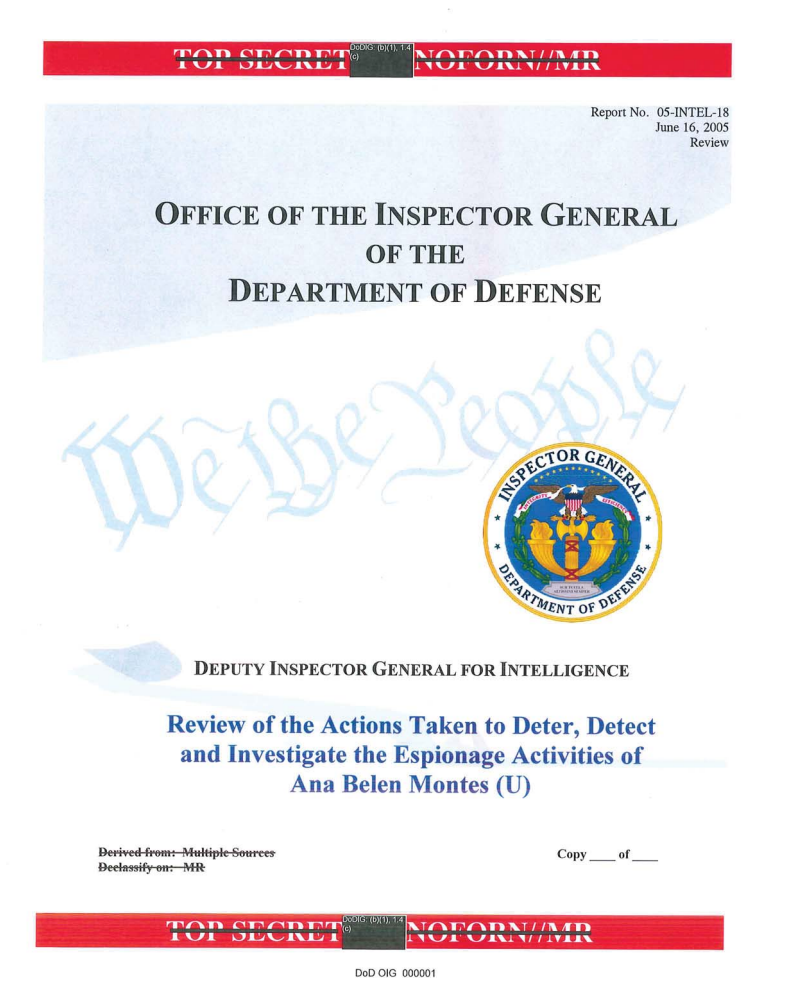
“Unlike Aldrich Ames and Robert Hanssen,” the review stated, “Ana Montes was not motivated by greed, frustration over poor work, low self-esteem, reckless behavior, lack of judgment, infidelity, fascination with the art of espionage, or other frailties.” The “portrait” of Montes was “much different from that of her fellow traitorous felons.”
“We found no credible evidence that she accepted payments from the Cubans that would approximate the amount that Ames and Hanssen received from the Soviets/Russians. Her ideological disposition fostered a negative view of US foreign policy, and that fixation coupled with a sense of moral righteousness sealed her commitment to a cause from which there was no alternative, at least in her mind,” the review added.
“In a series of debriefings following her arrest and conviction, Montes said that [President Ronald Reagan’s] 1980s regional policy of opportunism led to the Granada intervention in 1983. That event crystallized her negative views on US foreign policy.”
From Montes' perspective, the US government “backed the wrong side in the wars in Central America in the 1980s, as she supported the leftist insurgents in El Salvador and Guatemala. She believed that the United States did not respect the countries of Latin America and caused the death of people ‘who didn’t deserve to be killed.’”
The Defense Department inspector general review further elaborated:
In her views, Cuba was victimized by U.S. repression and she concluded that she had the “moral right” to provide information to Cuba. Throughout her career as a clandestine agent, she believed that “destiny was offering me an opportunity to do everything that I could to help Cuba.” She often exclaimed, “I couldn’t give up on the people I was helping.” In sum, she indicated that she “felt morally rewarded.”
Montes saw US support for the Contras in Nicaragua as unjust and wrong. She had a negative impression of US policy on Cuba, believing that Cuba was not an enemy or even a threat to the United States. She believed that the fall of the Soviet Union increased the probability that the United States would invade Cuba. She said, “If the United States could invade Panama for no justifiable reason, then they could just as easily invade Cuba and take advantage of their weakness.” In her view, Cuba needed her help to defend itself. She believed that U.S. policy was to try to destroy Cuba or force it to change the way it functions. She admired [Fidel] Castro, believing that he was a nationalist who would not have gone “running into the hands of the Russians” if the United States had not tried to overthrow his regime. Montes claimed that she was not a Communist but that she strongly sympathized with the socio-economic goals of both the Cuban and Nicaraguan revolutions. She claimed that her world view was similar to that of Castro…
Her colleagues in the “intelligence community” apparently knew all about these views, which motivated Montes to work at the DIA on Nicaragua and Cuba issues. “None apparently believed that they were extreme enough to worry about.”
Montes never took any copies of classified material from the DIA. She found it unwise, an aspect that the inspector general for the Defense Department twisted into a kind of super-spy decision.
“Significantly, this scheme played to Montes’ grandiose perception of health as a comrade-in-arms with the Cubans. By passing classified information verbally and constructing notes from memory, Montes saw herself as an equal with her Cuban comrades, not as a menial espionage tool extracting classified documents from ‘enemy’ installations.”
US security officials were hung up on the “significant control” that Montes had over how much information and what kind of information she shared with Cuba, but the independence was emblematic of the fact that she was not working for Cuban intelligence. It was a partnership, and she set the terms for their arrangement because she was not personally profiting off the information.
‘Moral Principle’ Over The ‘Laws of a Nation’
Montes saw herself as someone engaged in an extended act of civil disobedience.
She told authorities during her debriefings that she knew “helping Nicaragua and Cuba was a violation of the law, but stated, ‘My sense of moral obligation persuaded me that this is what I had to do or I could not live with myself.’”
The review put it another way: “[Montes] was being asked to help a people who were in dire jeopardy, and she could not morally refuse; this was a situation when moral principle took precedence over the laws of a nation.”
Montes informed the Cubans that she “had no intention of passing intelligence information on countries other than those which she had an interest, primarily Nicaragua and later Cuba, and she would not attempt to gain access to classified information that was not within her purview.”
“Throughout her post-arrest debriefings,” the review recalled, “she consistently claimed that she could not recall that the Cubans attempted to direct her to seek employment with the DIA. Rather, she decided to apply for a position that would give her access to information of value for Cuban support to the Sandinista regime [in Nicaragua].”
In 1990, when Montes was assigned to work on “Nicaragua issues,” she commented on “how ironic it was that she was assigned the Nicaragua portfolio the same year the Nicaraguan people democratically elected Violeta Chamorro president; thus, the basis for her initial moral at U.S. policy toward that country was no longer relevant.”
Famed defense lawyer Plato Cacheris, who also represented Hanssen, was Montes’ attorney and advised her to accept a plea agreement in 2002. She “admitted” that she was “specifically targeted by the Cubans to apply for a position at the DIA and that they assisted her in preparing her application.”
Pleading guilty to this “fact” was done to help her avoid the fate of Hanssen, who was sentenced to 15 consecutive life sentences at ADX Florence, a federal supermax prison in Colorado.
The US Foreign Policy That Montes Endangered
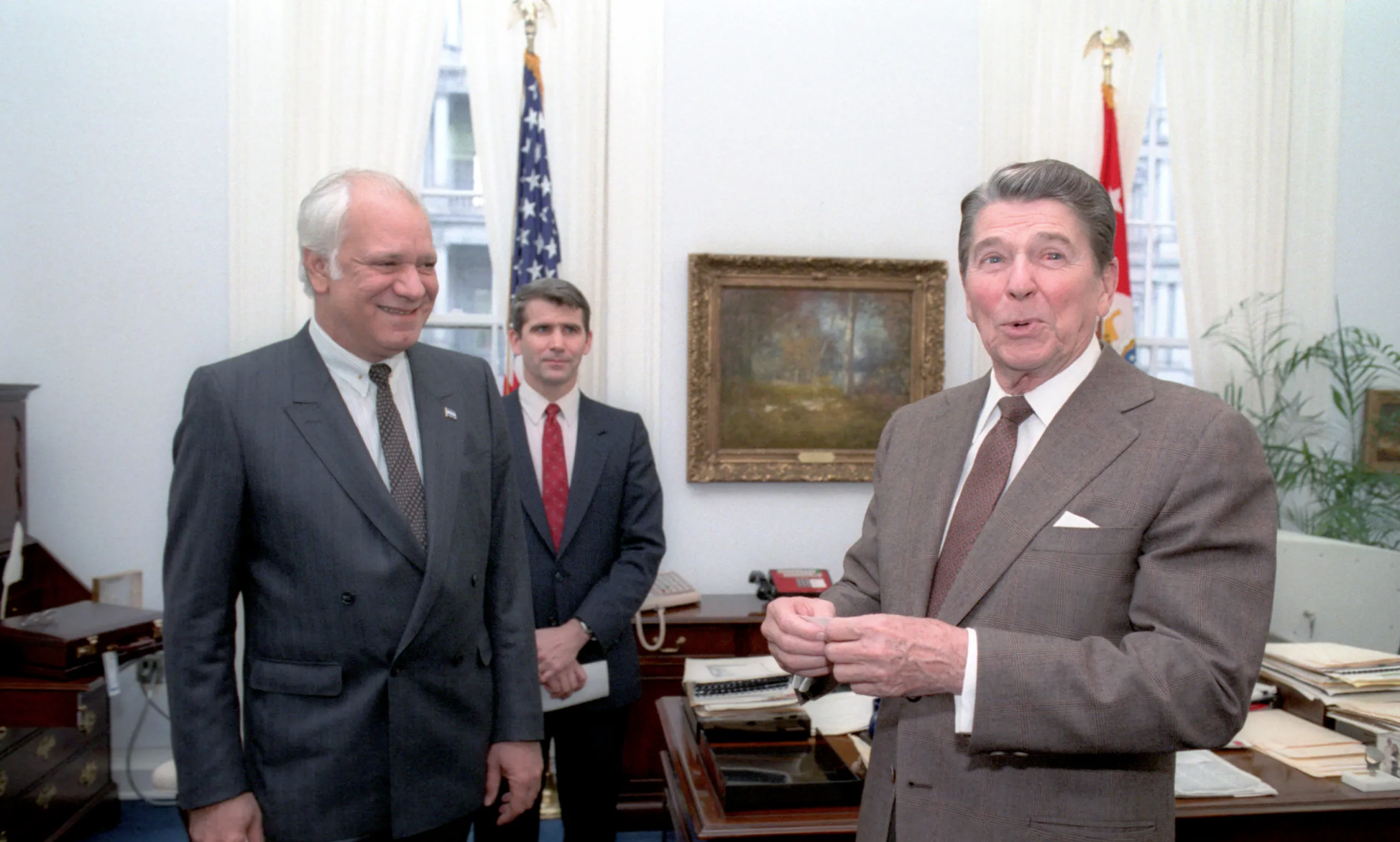
Montes’ tradecraft ensured that US security agencies would never know the entire scope of the information that she shared with Cuba. Intelligence officials and FBI agents also did not have the benefit of advancements in technology that now make it much easier to identify “insider threats” or the sources of leaks.
Yet it has been reported that Montes revealed the identities of a handful of CIA officers who were engaged in operations in Cuba. She also reportedly revealed the location of a secret US military base in El Salvador and the existence of a National Reconnaissance Office (NRO) secret satellite known as “Misty” that was launched in March 1990.
US Special Forces in El Salvador trained members of the Salvadorian army, who engaged in torture and committed acts of terrorism to control the population.
The agents that Montes exposed were likely carrying out the CIA’s “Track Two” policy [PDF] of supporting Cuban exiles and Cuban exile groups, as proposed after the Bay Of Pigs disaster in 1961. The policy goal was to back these groups so that they could “shake the Castro regime,” and even as the Cold War fizzled in the early 1990s, this policy was still preferred.
The CIA’s “rules of engagement” [PDF] for supporting the exile group Junta Revolucionario Cuba (JURE) in the 1960s provide an example of how arrangements functioned. Operations were “executed exclusively by Cuban nationals dedicated to the idea that the overthrow of the Castro/Communist regime must be accomplished by Cubans inside and outside Cuba working in concert.”
At any moment that the policy of backing JURE became too costly, the US could “withdraw financial support.” Operations had to be launched outside of US territory. “The CIA’s presence and direct participation would be kept at an absolute minimum.” The US government would “publicly deny any participation” in the group’s activities.
The CIA backed the “infiltration” of Cuba with propaganda material via “open mails, legal travelers and couriers, with special emphasis on selective black operations.” Agents even planned “propaganda balloon operations.”
One Cuban exile group known as Brothers to the Rescue (BTTR) took advantage of the “Track Two” policy. In 1995, José Basulto and other pilots repeatedly flew planes into Cuban airspace and dropped propaganda to provoke a response from the Castro government and followed a template familiar to the CIA.
Peter Kornbluh of the National Security Archive and William LeoGrande, co-author of Back Channel to Cuba: The Hidden History of Negotiations between Washington and Havana, recalled:
Their most provocative act in 1995 came on July 13, when Basulto's Cessna Skymaster buzzed Havana, raining down thousands of religious medallions and leaflets reading ‘Brothers, Not Comrades’ along the Malecón, Havana's broad seaside avenue. ‘We are proud of what we did,’ Basulto exalted on local TV after landing back in Miami. ‘We want confrontation,’ Basulto declared, boasting that his bold incursion served ‘as a message to the Cuban people...The regime is not invulnerable.’
Cuba would not tolerate these violations of their sovereignty. The government warned the US that Cuban security forces would do what was necessary to halt the “acts of provocation.” That included shooting down airplanes.
Federal Aviation Administration (FAA) officials in Cuba warned Basulto to “stay away from Cuba” while the US State Department urged Cuba to show restraint, according to Kornbluh and LeoGrande.
But Basulto refused to stop the provocations, and on January 13, 1996, planes dropped “half a million leaflets exhorting the Cuban people to ‘Change Things Now.’ His ability to penetrate Cuban airspace, Basulto bragged on the radio back in Miami, demonstrated that ‘Castro isn't impenetrable, that many things are within our reach to be done.’”
Cuban military officers did not immediately shoot down the aircraft because they believed Cuba would be seen as the “culprit” and the violators would “get off scot free.”
Yet on February 24, Castro’s patience came to an end. As Kornbluh and LeoGrande wrote, Cuban controllers warned BTTR pilots not to enter the country’s airspace. “I inform you that the zone north of Havana is active. You run danger by penetrating that side of North 24.” To which Basulto responded, “We are ready to do it. It is our right as free Cubans."
Acting on Castro's standing orders to prevent another penetration of Cuban airspace, two MiG-29 jets scrambled from their base at San Antonio de los Baños. The Cuban pilots followed none of the international protocols for warning, intercepting, and escorting unarmed civilian planes. Instead, at 3:19 p.m., a heat-seeking missile obliterated the first BTTR Cessna; at 3:26, the second was shot down. The attack took the lives of four young Cuban-Americans: Mario de la Peña, Armando Alejandre, Carlos Costa, and Pablo Morales. Only Basulto and his three crew members escaped back to Miami.
Basulto was trained by the CIA, along with around 1,500 other Cuban exiles. He was involved in the Bay of Pigs and also attacked a hotel in August 1962 in an attempt to assassinate Castro. He proudly proclaimed in one interview, “I was trained as a terrorist by the United States, in the use of violence to attain goals.”
According to the Defense Department inspector general review, Montes worked at the Pentagon for two weeks following the incident and provided “Cuban subject-matter expertise and intelligence support to the Joint Staff Brothers to the Rescue Task Force.”
One coworker raised suspicion about Montes, particularly her involvement with a DC think tank known as the Center for Defense Information (CDI) that said the US shared blame for the tragedy. But a DIA special agent who investigated her found no evidence to implicate her.
The BTTR incident was devastating for policymakers in President Bill Clinton’s administration, who wanted to end the embargo and turn the page on Cold War policies against Cuba. It was a gift to Cuban exiles and US security officials, who still favored regime change regardless of the cost.
[For further details on the CIA's history of tactics in support of Cuban exile groups, see this report on CIA operations against Cuba prior to the assassination of President John F. Kennedy: PDF]
Ending Regime Change Policy, Lifting the Embargo
President Barack Obama issued a directive during his final months in office that represented an attempt to normalize relations with Cuba. “We are not seeking to impose regime change on Cuba,” Obama declared, and additionally maintained that the embargo was outdated and should be lifted.
In spite of Obama’s effort to open the US to Cuba and defy right-wing opposition in the US Congress, President Donald Trump undid much of what Obama set in motion.
The Washington Office on Latin America (WOLA) noted that Trump “swiftly imposed new restrictions prohibiting U.S. companies from doing business with certain Cuban companies managed by the armed forces and prohibited U.S. visitors from staying in hotels operated by those companies. It eliminated people-to-people educational travel, placed strict caps on family remittances, and made it impossible to send remittances by wire service.”
Trump re-designated Cuba as a “state sponsor of terrorism” in his final days as president. The intention was to poison US-Cuba relations for President Joe Biden, and it worked. Though Biden has relaxed a few of the sanctions that Trump imposed or restored, the embargo remains in full force.
While discussing his book on Montes for “Washington Post Live,” Jim Popkin said, “There’s a temptation to discount Cuba as a besotted old tiger eager to harm the United States but lacking the fangs and fury to pull off the job.”
“[Cuba’s] intelligence services are really good. They were trained by the Soviets, and they’re very clever and crafty without a lot of money.”
Remarkably, Popkin added, “I had one FBI official say they don’t have any rules. There’s no morality, and no Congress keeping an eye on them. So it’s a lot easier for them than it is for our own spy services.”
The only thing more absurd than this statement is the fact that Popkin apparently believes it. (Well, actually, "Havana Syndrome" might be more absurd.)
Congress does not conduct meaningful oversight of the CIA’s actions or any other US spy agency’s actions against Cuba. To scrutinize the CIA and other spy agencies conduct toward Cuba would require Congress to oppose the regime change policy that has defined US actions for decades. Because such a vast and influential swath of US representatives and senators back meddling in Cuba to further US policy, the CIA can lie, cheat, and steal as much as it deems necessary.
However, Popkin seems unfazed by the CIA’s history of supporting violence against Cuba. He still subscribes to the Cold War ideology that views Cuba as a threat.
Popkin also would have the public believe that Cuban intelligence “manufactured Ana.” He parrots what US security officials would say about Montes. “They were telling her where to get jobs.”
When Montes was sentenced in October 2002, she read a statement that promoted the idea that “all the world is one country.” She told a US court that she believed in order to have “harmonious relations” with countries the US needed to treat other countries the way that the US wanted to be treated. “It is a principle that, tragically, I believe we have never applied to Cuba.”
“I engaged in the activity that brought me before you because I obeyed my conscience rather than the law,” Montes declared. “I believe our government's policy towards Cuba is cruel and unfair, profoundly unneighborly, and I felt morally obligated to help the island defend itself from our efforts to impose our values and our political system on it.”
“We have displayed intolerance and contempt towards Cuba for most of the last four decades. We have never respected Cuba's right to make its own journey towards its own ideals of equality and justice."
“I do not understand why we must continue to dictate how the Cubans should select their leaders, who their leaders cannot be, and what laws are appropriate in their land," Montes further stated. "Why can't we let Cuba pursue its own internal journey, as the United States has been doing for over two centuries?”
Having pled guilty to the crime of espionage, Montes reckoned, “My way of responding to our Cuba policy may have been morally wrong. Perhaps, Cuba's right to exist free of political and economic coercion did not justify giving the island classified information to help it defend itself. I can only say that I did what I thought right to counter a grave injustice.”
Montes was incarcerated at Federal Medical Center Carswell more than 20 years ago, hoping that one day the US would abandon its position of hostility towards Cuba. She desired a future where Cuba dropped its attachment to security measures that are favored to protect it from the US government.
Nothing Montes shared with Cuba ever put the US population at risk. It appears to have only jeopardized the secrecy of operations intended to disrupt Cuba and provoke retaliation that would necessitate further anti-Castro operations.
Unfortunately, the US hybrid war on Cuba persists. The international community stands opposed to this cruelty that costs Cuba billions of dollars every year, and today the morality of the US national security state (or lack thereof) is of much more importance than the danger that Montes posed to US spy operations and American foreign policy.

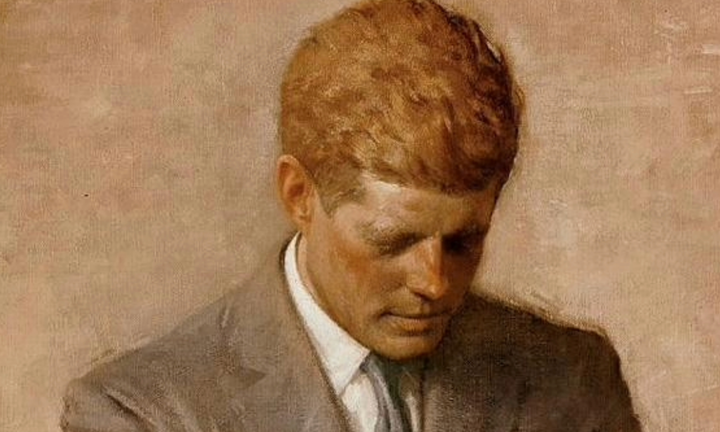
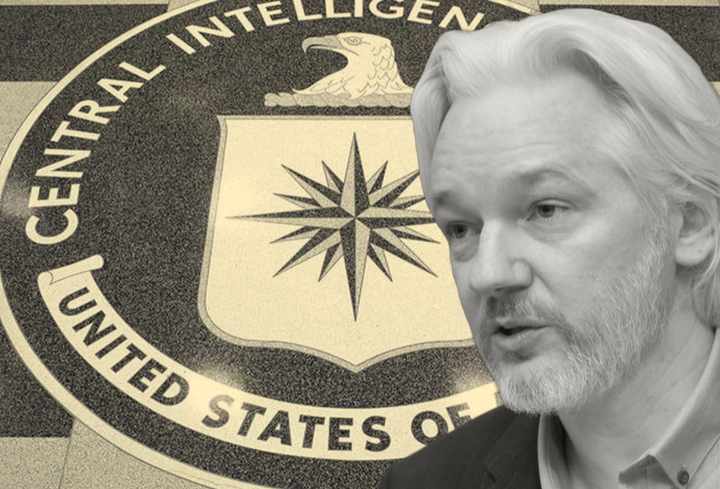
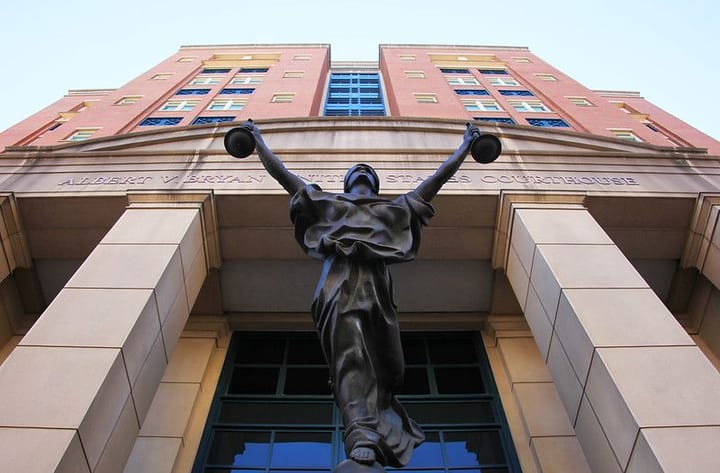
Comments ()